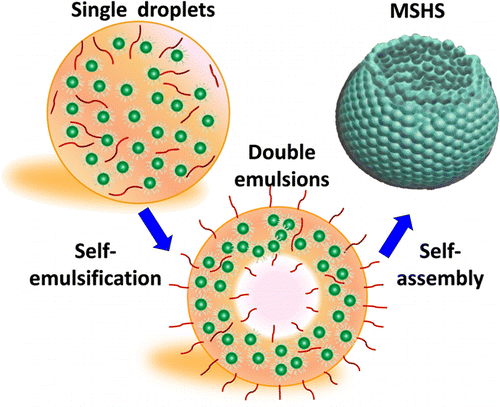Scientists reveal novel controllable assembled structure of magnetic nanoparticles as a smart platform for biomedical applications
By adjusting the hierarchical structure of ordered self-assemblies of magnetic nanoparticles (MNPs), novel magnetic phenomenon could be achieved, which would implement multi-functional applications at different scales. However, how to design and regulate the self-assemble structure of MNPs is a key problem in understanding the structure-activity relationship, as well as improving the related material performance.
Institute of Chemistry, Chinese Academy of Sciences (ICCAS) researcher group led by Prof. YAO Li made a progress on the controllable self-assembly of functional magnetic materials as a smart platform for biomedical applications. The results were published on Journal of the American Chemical Society entitled “Generation, characterization, and application of hierarchically structured self-assembly induced by the combined effect of self-emulsification and phase separation”.
The group developed a facile self-assembly strategy based on double emulsions generated via the combined effect of self-emulsification and phase separation to design hierarchically structured magnetic single-hole hollow spheres featured with uniform size, controllable hole, and tunable magnetic properties. The obtained assembly fully capitalized on both the multifunctional properties of MNPs and container features of single-hole hollow spheres.
Moreover, the magnetic properties showed obvious improvement and can be tuned by modulating the assembled structure. Thus, they can be used as a smart platform with multiple functionalities including image contrast enhancement, selective encapsulation for biomacromolecules, on-demand release, and magnetically guided transport. This strategy is very promising in the design of hierarchically structured assemblies for desired applications in biomedicine and other fields.
Additionally, Yao’s group has synthesized magnetic Janus particles featured with dual wettability, shape anisotropy and magnetoresponsive capacity using a novel phase separation and magnetically driven dewetting method. These Janus particles further served as building blocks for constructing large-area, amphiphilic self-assembled monolayer, which might open up quite some interesting bioapplications in anti-bioadhesion materials, intelligent coatings, antireflective, and antifouling surfaces (Adv. Mater. 2016, 28, 3131–3137).

Schematic illustration of the self-assembly strategy of magnetic nanoparticles based on the double emulsions (Image by YAO Li)
Contact:
Prof. YAO Li
The Laboratory for Structural Chemistry of Stable and Unstable Species ,
Institute of Chemistry,Chinese Academy of Sciences
Email: yaoli@iccas.ac.cn





